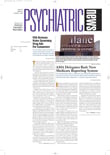Obesity is known to increase the risk for a number of health consequences—heart disease, stroke, diabetes, gallbladder disease, osteoarthritis, sleep apnea, and some cancers, for example.
Now it appears to be a risk factor for Alzheimer's disease as well, according to a study in the October Archives of Neurology headed by Miia Kivipelto, M.D., Ph.D., of the Karolinska Institute in Stockholm.
In the 1970s and 1980s, large population-based, random samples of Finns were surveyed on health status and medical history. Their blood pressure and cholesterol levels were also measured, and their body mass index calculated. Then in 1997, Kivipelto and her colleagues invited a random sample of 2,000 Finns who had participated in the earlier surveys to participate in a follow-up study. Some 1,500 subjects agreed to do so.
These 1,500 subjects had been 51 years old on average during the initial surveys; they were now 72 years old on average.
In the follow-up study, which took place in 1998, blood from subjects was drawn to determine which variant of the apolipoprotein E gene they possessed, since the e4 variant of the gene is a known risk factor for Alzheimer's. They were also assessed according to DSM-IV criteria for dementia. Sixty-one of the subjects were found to have dementia, and 48 of them were found to have Alzheimer's disease.
The researchers then determined if body mass index at midlife had any link with developing dementia late in life. The answer was yes. Dementia was found significantly more often in subjects who had been overweight (with a BMI from 25 to 30) or obese (with a BMI of 30 or higher) in midlife than in subjects who had been of normal weight (with a BMI lower than 25) at that time. Specifically, while only 3 percent of normal-weight individuals later developed dementia, 4 percent of overweight individuals and 10 percent of obese individuals did.
Individuals who had been overweight but not obese in middle age were at no greater risk of later developing dementia than were individuals who had been of normal weight at that age. But those who had been obese in middle age had dementia risk that was twice as high as controls.
And when the scientists took other possibly confounding factors—midlife high blood pressure; midlife cholesterol level; midlife smoking; a history of diabetes, heart attack, or stroke, and apolipoprotein E gene status—into consideration as well, they still found that individuals who had been obese in midlife were about twice as likely to have dementia later in life.
Finally, the researchers found that high blood pressure and high cholesterol levels at midlife were also significant risk factors, each of them increasing the risk about two times. In persons having all three risk factors—obesity, high blood pressure, and high cholesterol—at midlife, the risk of dementia was six times higher than in persons having none of the three factors.
Therefore, the results “show that obesity at midlife may increase the risk of dementia and Alzheimer's disease later in life,” the researchers said. Also, they pointed out, “Body mass index is an easily available and inexpensive measurement for assessing the nutritional status of an individual, and high BMI can serve as a useful indicator of the increased risk of dementia.”
The study was financed by the Aging Program of the Academy of Finland, Kuopio University Hospital, Academy of Finland grants, the Gamla Tjanarinnor Foundation, and the Swedish Council for Working Life and Social Research.
Arch Neurol 2005 62 1556
